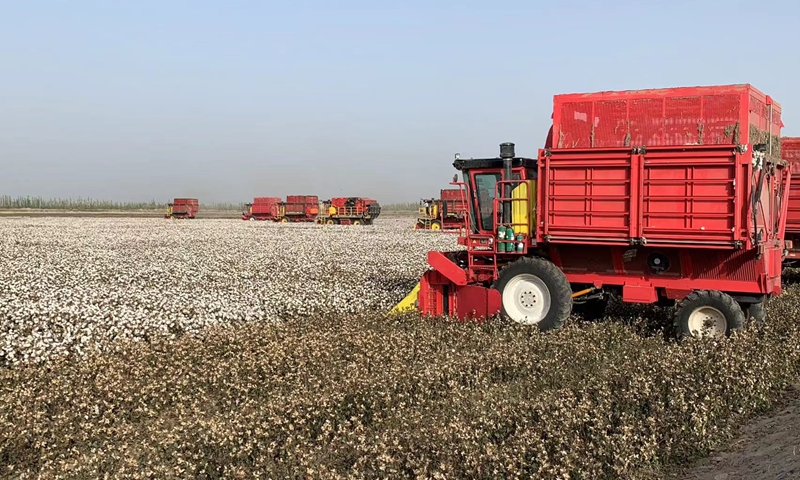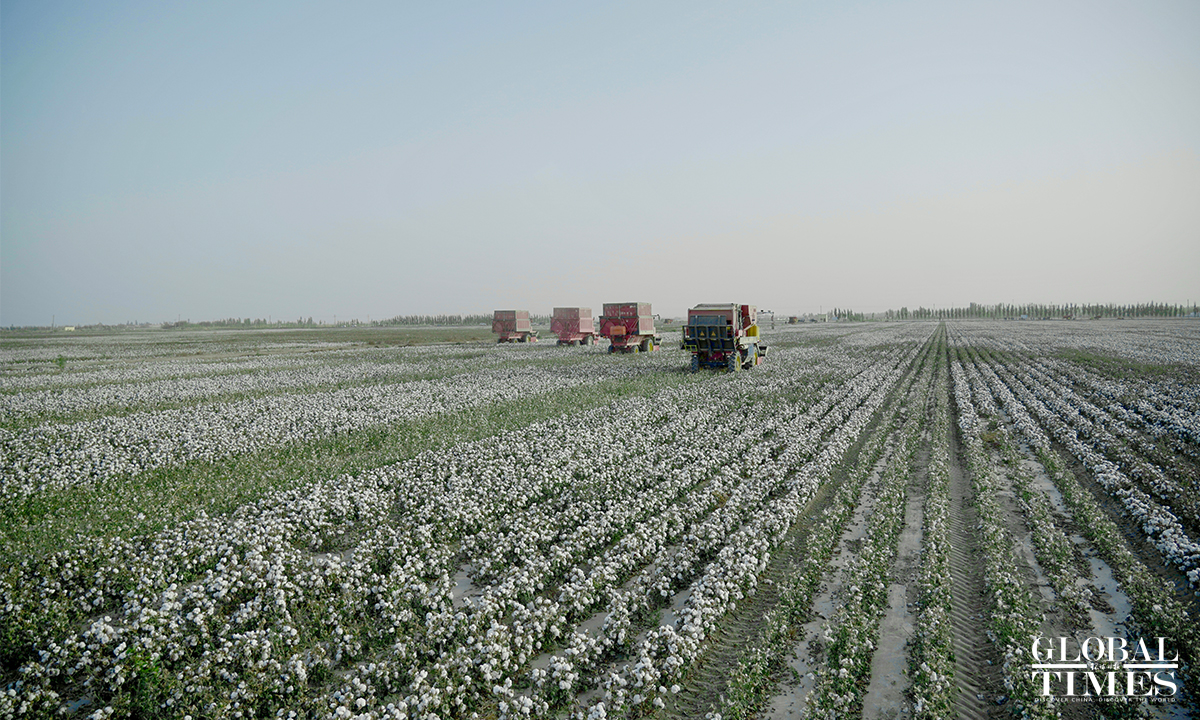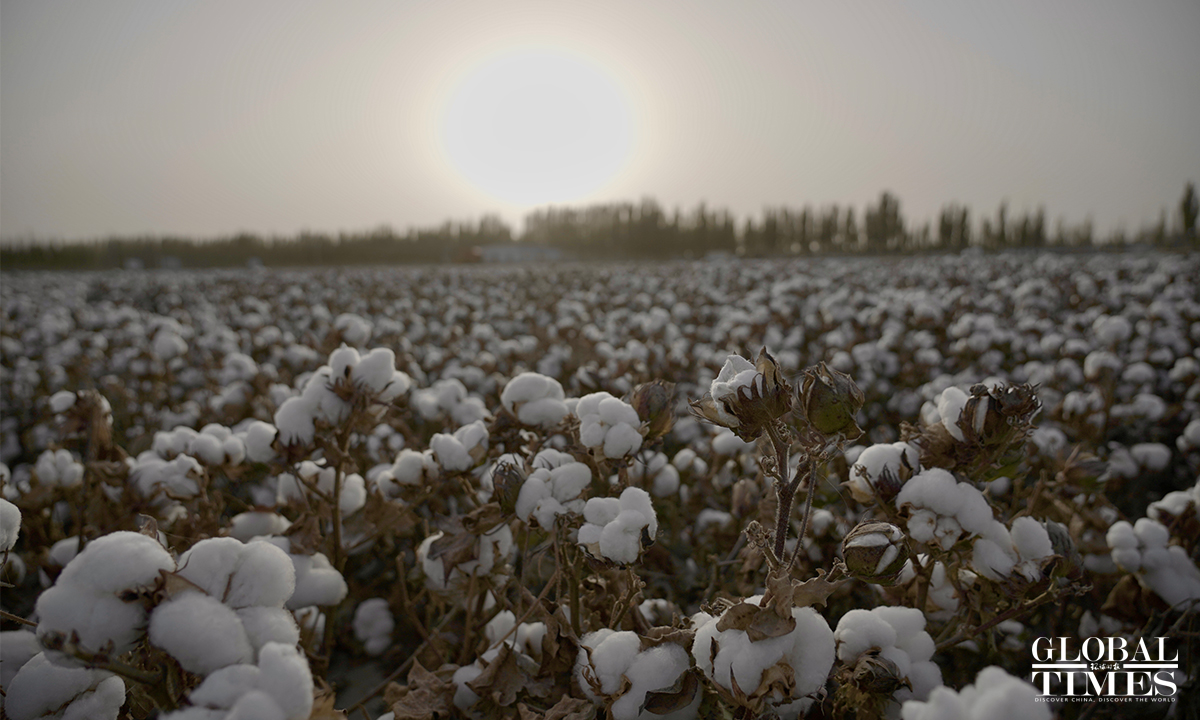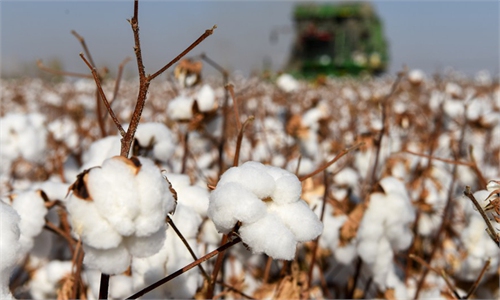On a bright and clear Friday afternoon, a total of 14 cotton-picking machines were lining up in cotton fields spanning 100 hectares in Shaya county, Northwest China's Xinjiang Uygur Autonomous Region. With a brisk whistle and folk songs being played, the 14 pickers started roaring and moving forward at the same time - marking the start of a month-long bumper harvest season of Xinjiang's pure, white cotton that thousands of locals sing and dance to celebrate.
In such a cheerful mood, it is hard to imagine that half a year ago, cotton production in Xinjiang was at the center of a storm created by Western slander and boycotts. During the harvest season, people can see the humming of cotton-picking machines, drone sprayers flying high in the sky, and internet-of-things modules for planting on trial - among all mechanization and intelligent agricultural measures applied, serving as the best piece of evidence debunking the "forced labor" claim hyped by some Western politicians and revealing how such claims are a lie.
The comprehensive mechanized rate of cotton farming and production in Aksu Prefecture- an important cotton producing base in Southern Xinjiang which accounts for 90 percent of China's long-staple cotton output - has reached over 90 percent this year, which greatly elevated both cotton farming efficiency and yields, local officials said at a press briefing on Friday.

Photo: Li Xuanmin/GT
Xinjiang's mechanized rate of cotton picking will exceed 75 percent this year, with an output estimated at 5.2 million tons. Xinjiang represents more than 85 percent of China's cotton yield.
Sun Laipu, the manager of a local farming machine provider company, told the Global Times that the 14 cotton-picking machines, driven by experienced operators, are able to complete cotton picking in three days. But in the past, a family could be busy picking cotton by hand throughout the harvest season.
Meanwhile, farmers are able to monitor the picking process and amount, with an app connected to the machines in some cases.
Lihua Agricultural Company, which owns the cotton fields, has hired 16 Uygur workers - most of whom own small farmland and have rented it to agricultural firms to enable more cost-effective machinery harvesting - to manage the farm from April to October, or from the period of cotton crop seeding to harvesting. Last year, the company hired over 20 people.
"In Xinjiang, most cotton production has been mechanized, with less manual work left for us except for clearing weeds and certain types of topping work. As efficiency rises, I am able to manage more fields and make more money," Naman Yasen, a Uygur cotton farmer who works for Lihua, told the Global Times on Friday. His income from April to October exceeded 40,000 yuan ($6,216), which is a very promising salary based on local standards.

Photo: Lin Luwen/GT
Cotton topping is another traditional manual production procedure gradually being replaced by plantation drones. The process involves cutting off the shoot tips of cotton plants to make mechanized picking more convenient.
Luo Pengshan, a manager of a local plantation drone sales company who is also a drone operator, told the Global Times on Thursday that the penetration rate of plantation drones, which is not only used in topping but also in spraying fertilizers and pesticide, in Aksu has topped 90 percent.
"Cotton farmers with 500 mu (33.5 hectares) to 1,000 mu land used to hire professional drone operator teams, but they have started buying and using it themselves as the operating system becomes more intelligent and user-friendly," Luo said.
Luo sells XAG plantation drones, which cost 40,000 yuan to 50,000 yuan each, and his Uygur consumer base is growing rapidly, now making up about 30 percent of his clients.
"In 2018, we only sold 100 units, but sales have peaked to over 300 units to date this year," Luo said. He added that it only takes a day for agricultural drones to spray pesticide to 1,000-mu lands, while in the past, it could take a worker a whole week to complete the job.
According to official data, Xinjiang had over 5,000 agricultural drones powered by China's BeiDou Navigation Satellite System by July, serving over 1.3 million hectares lands.
"We're not only talking about mechanization. This is only the first step. Smart agriculture is also gaining traction in Xinjiang," Hu Jiahua, a local agricultural bureau official in Aksu, told the Global Times on Thursday.
A homegrown unmanned seeding machine based on China's BeiDou Navigation Satellite System, which has been used widely in the April cotton seeding season, is one such example, according to Hu.
"The machine is able to automatically distribute seeds in a straight way, and workers only need to do some assisting work, like helping the machine turn around. We also upgraded the technology to install intelligent censors that could monitor the depth and width of plowing in real time. If the designated depth is not reached, the system will automatically send an alarm," Sun said.

Photo: Lin Luwen/GT
According to Luo, his company is training an IoT module that could provide real-time updates on the growth of cotton and the soil condition, and based on the data collected, farmers could scientifically judge the best time to seed and to spray insecticide. XAG has also been developing an intelligent robot that can tell the difference between weeds and crops, paving the way for the mechanization of seed killing, according to Luo.
"Even if you want a manual job in Xinjiang's cotton industry, there's not that many to offer. As we moved from mechanization to smart tech, aren't the 'forced labor' accusations ridiculous?" Luo asked.
Yanizi Amuxi, a Xinjiang official, also said at the press briefing on Friday that the US and Western slander against Xinjiang cotton, citing "force labor," is a complete lie that ignores how Xinjiang strives to protect workers of all ethnic groups and how Xinjiang's cotton and textile industries benefit the people of all ethnic groups.
"It is a bullying practice that uses unjustified tactics to maintain their position in relevant industries in the global industrial value chain," Amuxi said.




